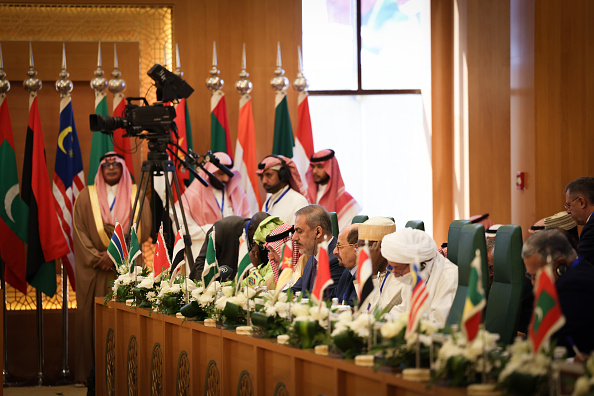It has been 50 years since members of the Organization of the Petroleum Exporting (OPEC) instituted an oil embargo on the United States and several other nations in response to their aid to Israel during the Yom Kippur War. Half a century later, Iran is looking to resuscitate the ban on crude exports, with Israel being the primary target. Could a revival of the 1970s “oil shock” be achieved? If so, the US Strategic Petroleum Reserve may be in no fit position to cope.
Iran and the Arab Oil Embargo
Iran Foreign Minister Hossein Amir-Abdollahian visited Jeddah, Saudi Arabia, on Oct. 18 for a meeting of the Organization of Islamic Cooperation (OIC) to condemn Israel over its actions against the Tehran-supported Hamas terrorist group. Local and international media report that Tehran’s foreign ministry proposes “an immediate and complete embargo on Israel by Islamic countries, including oil sanctions.” The government also recommends expelling Israeli ambassadors, pursuing Israel for “war crimes,” and demanding Israel halt its “siege” on Gaza.
After the meeting, the OIC did not acquiesce to demands from the Iranian regime. In fact, according to a statement from the group, there was zero mention of any economic boycott against Jerusalem. That said, the entity did champion an independent Palestine state, requested “the immediate cessation of the barbaric aggression of the Israeli occupation forces,” and slammed the international community’s support for Israel.
“[The OIC] calls upon international actors to engage in sponsoring a serious political path to achieve peace based on ending the illegal Israeli occupation that had begun in 1967 and implementing the two-state solution, within a clear time frame, as stipulated in the rules of international law and United Nations resolutions, and referring to the Peace process and the Arab Peace Initiative.”
But while Iranian officials did not get what they wanted, it could be a vital indicator that the war in Israel is poised to expand beyond Israel’s borders and intensify with more players having a role in the conflict. And this could spell bad news for global energy markets and the worldwide economy.

(Photo by Murat Gok/Anadolu via Getty Images)
Consequences for Oil
Following the oil embargo, then-President Gerald Ford established the Strategic Petroleum Reserve (SPR), emergency stockpiles that would only be used in the event of supply disruptions. In other words, the SPR was explicitly designed in response to this type of situation. Should Iran succeed in resurrecting oil restrictions, whether toward Israel or other Western countries, it would be challenging for the US to deploy barrels from the rainy-day fund.
According to the Department of Energy’s Energy Information Administration (EIA), the SPR stands at 351.274 million barrels, meaning the United States possesses approximately 17 days’ worth of emergency stocks. President Joe Biden had drained domestic reserves by roughly 40% for what many claim are political endeavors rather than in response to an actual disaster.
“Regardless, the potential impact on oil is huge and historic. There are growing worries about the global and US supply situation,” said Phil Flynn, an energy strategist at The PRICE Futures Group, in a research note. “The fact is that the Strategic Petroleum Reserve has been drained makes it less effective as a buffer against this type of risk the market is facing today. This is the type of scenario the SPR was built for. Not as a mechanism to try to control prices or to lower gas prices ahead of an election.”
Indeed, the SPR has reinserted itself into geopolitical conversations because oil prices are responding to extremely tight conditions in the US and abroad.
At home, EIA data revealed that commercial inventories plummeted nearly 4.5 million barrels for the week ending Oct. 13. Storage levels in Cushing, Oklahoma, fell again by 758,000 barrels (they have declined in ten of the last 12 weeks by enormous volumes). Globally, crude markets have slipped into a deficit as Saudi Arabia, Russia, and OPEC+ members limit exports and trim output. Therefore, it is unsurprising that oil prices are trading at $90 a barrel and marching toward $100 again.
 Before the Israel-Gaza War, energy commodities had steadily risen, reigniting inflationary pressures in the US and elsewhere. With a potential powder keg waiting to go off in the Middle East, economic observers fear that the volatility in oil could spill over into the broader inflation discussion. And, of course, this could spark implications for the economy because it might force further tightening by central banks across the globe, including the Federal Reserve.
Before the Israel-Gaza War, energy commodities had steadily risen, reigniting inflationary pressures in the US and elsewhere. With a potential powder keg waiting to go off in the Middle East, economic observers fear that the volatility in oil could spill over into the broader inflation discussion. And, of course, this could spark implications for the economy because it might force further tightening by central banks across the globe, including the Federal Reserve.
Has the Environment Changed?
Iran is an energy powerhouse and has seen production and shipments return to 2018 levels. But the US, despite the anti-fossil-fuel efforts of the current administration, is also a mighty oil producer, with output topping 13 million barrels per day for the first time since before the coronavirus pandemic. It is hard to dismiss the ramifications that an Iran-endorsed embargo would have on international energy markets. At the same time, this is not 1973 anymore: more nations are producing oil, and natural gas is the so-called chief bridge fuel. For foreign adversaries 5,600 miles away, the world is still stuck in that time. Conditions are different in the sense that Middle Eastern countries have aligned themselves with China and Russia and joined BRICS and BRICS+, proving they are no longer beholden to Western influence, especially sanctions.
In the end, can the world afford another prolonged and far-reaching war? It might not be something any country wants to test and find out.



